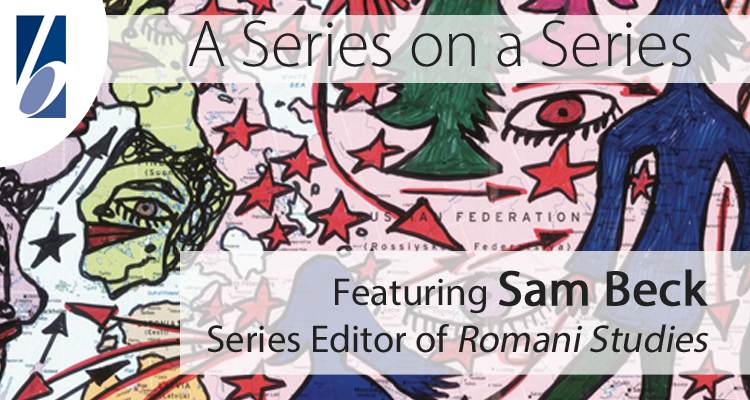
Interview with Series Editor Sam Beck, Romani Studies
Did you know Berghahn Books has over one hundred series? Covering a wide range of subjects and areas, Berghahn’s series list continues to grow as new interventions and trends in scholarship are made.
The recent Romani Studies series is a fine example of this trajectory. In the course of the twenty-first century, Europe has become aware that the Roma are its largest minority, with an estimated population of 11 million people. As a result, Romani Studies has emerged as an interdisciplinary field that offers perspectives derived from the humanities and social sciences in the context of state and transnational institutions. One of its aims is to remove the stigma surrounding Roma scholarship, to engage with the controversies regarding Roma identity and, in this way, counter anti-Roma racism.
The first volume in the series, Roma Activism: Reimagining Power and Knowledge, edited by Sam Beck and Ana Ivasiuc, was released in 2018. We are delighted to announce that Volume 2, Inward Looking: The Impact of Migration on Romanipe from the Romani Perspective by Aleksandar G. Marinov will be publishing this month. We’re also excited for Volume 3, The Roma and Their Struggle for Identity in Contemporary Europe, edited by Huub van Baar and Angéla Kóczé, releasing February 2020.
In anticipation of the future volumes progressing toward publication, we’ve conducted an interview with Sam Beck, Romani Studies Series Editor. We’ll be posting Sam’s interview answers throughout the season.
What drew you towards Roma scholarship?
SB: This question requires context, a context that is decidedly personal. As a child growing up in Vienna, Austria I would hear Roma as they moved on the cobblestone street on which my family lived. Their wagons and horses that pulled them made a distinctive sound and as I looked down from my apartment building, I could see a row of them pass by. It is an image that I retain to this day. As an undergraduate at Portland State University, I participated in a program developed by the German Department that would send students to Titoist Yugoslavia for a year of study (1967–1968) at Zagreb University. While in Yugoslavia, I wandered about in Zagreb and other parts of the country where I found Roma just about everywhere. As a participant in a research project concerning a confederacy of Turkish-speaking nomadic pastoralists in Iran (1969-1971), I recognized Roma ironsmiths and musicians who migrated with them.
My doctoral and post-doctoral research in Romania amounted to about 5 years of coming to understand Romania, Romanian history and society. It was at this time that I more fully focused on the Roma as a research project. Anthropology—at least the anthropology to which I am committed—focuses particular attention on those populations that are positioned at the margins of social and economic life. I came to study the marginalized and oppressed in society and the conditions that produce marginalization and oppression. I came to this realization of what anthropology is and what it can become as I developed my thinking about the obligation anthropologists have in carrying out fieldwork. As Faye Harrison put it, “Anthropology [is] designed to promote equality and justice-inducing social transformation,” orienting anthropologists to be “engaged in struggles against racist oppression, gender inequality, class disparities, and international patterns of exploitation and ‘difference’ rooted largely in capitalist world development.”
I came to view anthropological work as potentially having a liberating force not only in terms of how we work with people while carrying out fieldwork, but also in liberating anthropology from its colonial past and its methods based on privilege. While carrying out research in Romania, both during my doctoral fieldwork and post-doctoral research, I met Nicolae Gheorghe, who was doing fieldwork on Roma as a sociologist and as a Romanian Roma. I met Nicolae at a time in his life when he was exploring his own identity. While we would, at the present time, understand this as a reflexive process in carrying out research, for Nicolae it was an internal struggle in which he was seeking to find his place in Romanian society as a Romanian citizen seeking to improve the conditions in which Romanians live. His focus on the Roma was deeply personal and intellectually challenging. Roma “tigani” (considered by Roma a pejorative term) are historically from perhaps as early as the 13th century an integral part of Romanian society. Romanian Roma were enslaved for hundreds of years and lived under Jim Crow-like conditions after their emancipation. While Roma can be found at virtually all socioeconomic layers of society as I was carrying out research in Romania, they made up the poorest of the poor, were treated as racial category, and identified as black (cioara).
As part of my post-doctoral research in Transylvania’s Fagaras region (Tara Fagarasului), a heavily researched area in the inter-war period for representing an ethnic Romanian way of life, I was seeking to understand the social history of economic specialization by geography and as it turned out by ethnicity. The ethnic aspect only came into view as I came to realize that every Romanian (and Hungarian and German Saxon) settlement in Transylvania, but across Romania more generally, had a symbiotic relationship with Roma settlements. As I sought to understand this relationship better, I found Roma to continue to practice various craft and artistic specialties on which others in Romania relied. During my post-doctoral years, I came to work directly with Nicolae and found what only later was identified in anthropology as a “decolonizing” effort.
SAM BECK is the former director of the New York City Urban Semester Program, and the current director of the Practicing Medicine Program at the College of Human Ecology of Cornell University. He has carried out fieldwork in Iran, Yugoslavia, Romania, Austria, Germany and the United States. With Carl Maida, he edited Toward Engaged Anthropology (2013) and Public Anthropology in a Borderless World (2015).
